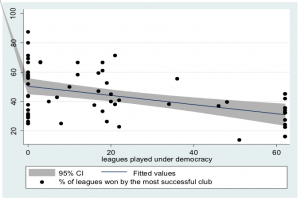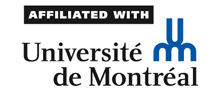By Ignacio Lago, Univesitat Pompeu Fabra, Barcelona *
The influence of politics on sports and more specifically on football (soccer) has been widely discussed, but no hard empirical evidence can be found in political science, economics or sports science research. We fill this gap by examining whether the competitive balance in football domestic leagues (i.e. the extent to which certain clubs dominate the domestic league) is affected by the country’s political regime, We rely on data from two samples of 47 and 49 European countries from 1950 through 2011 and 1,980 and 1,960 football domestic leagues, respectively,
We argue that domestic leagues are more heavily dominated by the same club in non-democratic regimes than in democracies. Democratic transitions trigger pressures to increase the competitive balance within football domestic leagues in two ways. First, the political manipulation of football decreases with democratization. The link between non- democratic regimes and specific teams, particularly evident in communist countries, breaks when a country experiences a transition to democracy. Secondly, at the same time, with the onset of democracy, capitalist modus operandi are progressively adopted by clubs and football then starts to operate as a market free of price restrictions with no salary caps or draft rights. The economic liberalization that takes place in transitions to democracy disperses resources that undermine the monopolistic dominance of certain teams supported by non-democracies and generates competition among descending and ascending teams.
The first piece of evidence supporting the argument that political regimes affect football domestic leagues is displayed in Figure 1. The relationship between the percentage of domestic leagues won by the most successful club in each country and the number of leagues played under democracy is displayed. As can be seen the competitive balance of football domestic leagues is positively correlated with the length of democracy. The average value of Winner in democracies, 40.75, is substantially lower than in non-democracies, 48.36.
In a second analysis, we examine the competitiveness of domestic leagues in the 13 countries which have experienced a transition to democracy after 1950. In all of them, not one of the most successful clubs during the non-democratic period has been the most successful club after democratization. More specifically, for the most successful club in the non-democratic period, winning the previous league significantly increases the probability of winning the league the next year when the country is not a democracy. However, when the country is a democracy, being the winner of the previous league does not affect its probability of winning the current year. In other words, when countries experience a transition to democracy, dominant clubs in the non-democratic period become weaker competitors.
Figure 1: Winners in football domestic leagues in democracies and non-democracies
Ignacio Lago, Universitat Pompeu Fabra and GEN
Carlos Lago-Peñas, GEN (University of Vigo)
Santiago Lago-Peñas, GEN (University of Vigo)
“Democracy and Football”, Social Science Quarterly, 2016 (early view)

